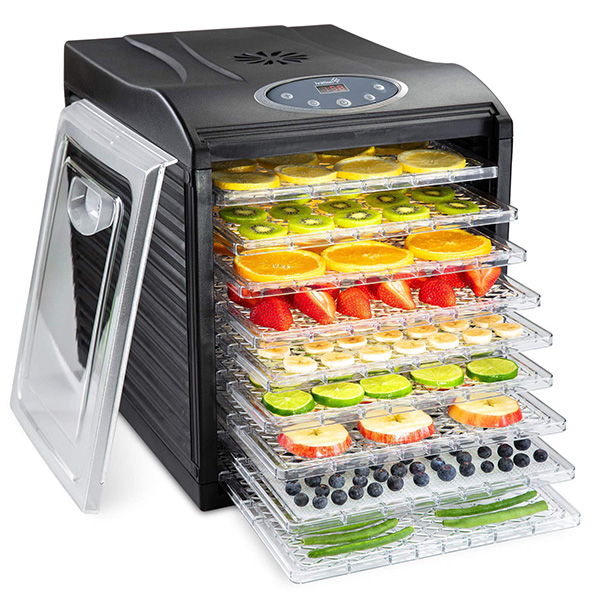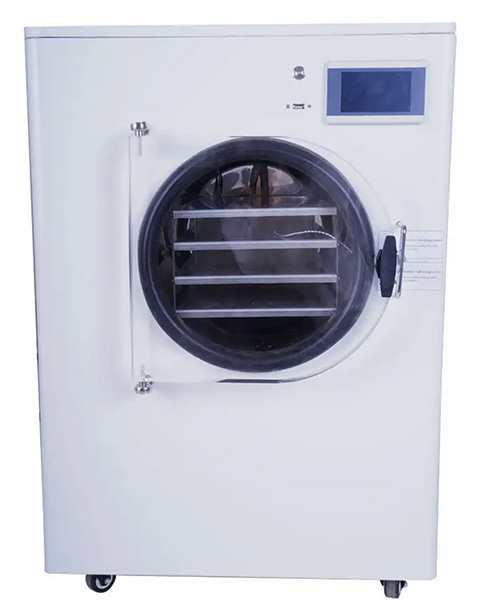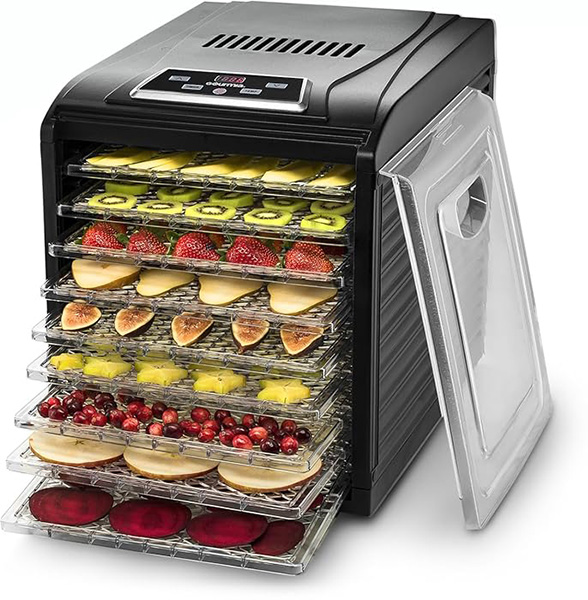
Content Menu
● Introduction to Freeze-Drying Technology
● Understanding the Freeze-Drying Process
● Benefits of Home Freeze-Drying
● Comparing Freeze-Dried vs. Dehydrated Food
● Best Home Freeze Dryer Options
>> 1. Harvest Right Freeze Dryer
>>> Small Harvest Right Freeze Dryer
>>> Medium Harvest Right Freeze Dryer
>>> Large Harvest Right Freeze Dryer
>> 2. Stay Fresh Freeze Dryer
>> 3. Blue Alpine Freeze Dryer
● Freeze Dryer Machine Comparison
● DIY Freeze-Drying Process
● Freeze-Dried Food Nutrition
● Long-Term Food Storage Solutions
● Freeze Dryer Capacity and Size Considerations
● Conclusion
● Frequently Asked Questions
>> 1. How long do freeze-dried foods last?
>> 2. Can all foods be freeze-dried?
>> 3. How do freeze-dried foods compare to frozen foods in terms of nutrition?
>> 4. Are home freeze dryers worth the investment?
>> 5. How much electricity does a home freeze dryer use?
Introduction to Freeze-Drying Technology
Freeze-drying, also known as lyophilization, is a cutting-edge food preservation method that has gained significant popularity among home enthusiasts and preppers alike. This process involves removing moisture from food while preserving its nutritional value, flavor, and texture. In recent years, the availability of home freeze dryers has revolutionized long-term food storage solutions, allowing individuals to create their own freeze-dried foods with ease.

Understanding the Freeze-Drying Process
The freeze-drying process consists of two main steps: freezing and vacuum drying. First, foods are frozen to temperatures well below 0°F. The colder the freeze, the more efficient the next step becomes. During the vacuum drying phase, the frozen water in the food undergoes sublimation, transitioning directly from a solid to a gas state. This process allows the food to retain much of its original texture, flavor, and nutritional content when rehydrated.
Benefits of Home Freeze-Drying
Home freeze-drying offers numerous advantages over other food preservation methods:
1. Longer shelf life: Freeze-dried foods can last up to 25 years when properly stored.
2. Nutritional retention: The process preserves most of the food's original nutrients.
3. Flavor preservation: Freeze-dried foods maintain their natural flavors better than other preservation methods.
4. Lightweight and compact: Ideal for camping, emergency preparedness, and space-saving storage.
5. Versatility: A wide variety of foods can be freeze-dried, including fruits, vegetables, meats, and even entire meals.
Comparing Freeze-Dried vs. Dehydrated Food
While both freeze-drying and dehydration are effective food preservation methods, they differ in several key aspects:
1. Moisture content: Freeze-dried foods typically contain 1-4% moisture, while dehydrated foods retain 15-20% moisture.
2. Shelf life: Freeze-dried foods last significantly longer than dehydrated foods.
3. Nutritional value: Freeze-drying preserves more nutrients compared to dehydration.
4. Rehydration: Freeze-dried foods rehydrate faster and more completely than dehydrated foods.
5. Texture: Freeze-dried foods maintain a texture closer to their original state when rehydrated.

Best Home Freeze Dryer Options
When it comes to choosing the best home freeze dryer, several factors should be considered, including capacity, size, and price. Let's explore some of the top options available in the market:
1. Harvest Right Freeze Dryer
Harvest Right is a leading brand in the home freeze-drying industry, offering a range of models to suit different needs and budgets.
Small Harvest Right Freeze Dryer
- Dimensions: 17.4" W x 21.5" D x 26.8" H
- Weight: 91 lbs
- Capacity: 1.5-2 gallons of fresh food per batch
- Ideal for small families or individuals
Medium Harvest Right Freeze Dryer
- Dimensions: 18" W x 21.25" D x 28.5" H
- Capacity: 7-10 lbs of fresh food per batch
- Suitable for larger families or those who want to process more food at once
Large Harvest Right Freeze Dryer
- Dimensions: 20.25" W x 23.75" D x 30.75" H
- Capacity: 12-16 lbs of fresh food per batch
- Perfect for serious food preservationists or those with large gardens
2. Stay Fresh Freeze Dryer
Stay Fresh offers an alternative to Harvest Right, with competitive features and pricing.
3. Blue Alpine Freeze Dryer
Blue Alpine is another brand worth considering, known for its quality and customer service.

Freeze Dryer Machine Comparison
When comparing freeze dryer machines, consider the following factors:
1. Capacity: How much food can you process in a single batch?
2. Size and weight: Will the machine fit in your designated space?
3. Energy efficiency: Look for models with lower power consumption.
4. Noise level: Some machines can be quite loud during operation.
5. Ease of use: Consider the user interface and overall user experience.
6. Warranty and customer support: Look for brands that offer comprehensive warranties and reliable customer service.
DIY Freeze-Drying Process
While commercial freeze dryers offer convenience, some enthusiasts opt for a DIY approach. Here's a basic overview of the process:
1. Prepare the food: Clean, slice, and arrange the food on trays.
2. Pre-freeze: Place the food in a regular freezer for several hours.
3. Set up the vacuum chamber: Use a vacuum pump and chamber to create a low-pressure environment.
4. Apply heat: Gradually warm the food while maintaining the vacuum to encourage sublimation.
5. Monitor progress: Check the food regularly to ensure proper drying.
6. Store: Once completely dry, package the food in airtight containers or mylar bags with oxygen absorbers.
While DIY methods can be cost-effective, they often require more time and effort compared to using a dedicated freeze-drying machine.
Freeze-Dried Food Nutrition
One of the significant advantages of freeze-drying is the preservation of nutritional value. Unlike other preservation methods, freeze-drying retains most of the food's original vitamins, minerals, and enzymes. This makes freeze-dried foods an excellent option for those looking to maintain a healthy diet while enjoying the benefits of long-term food storage.
Long-Term Food Storage Solutions
Freeze-dried foods play a crucial role in long-term food storage strategies. Whether you're preparing for emergencies, stocking up for outdoor adventures, or simply looking to reduce food waste, freeze-dried foods offer an excellent solution. Here are some tips for effective long-term storage:
1. Use airtight containers or mylar bags to prevent moisture and oxygen exposure.
2. Add oxygen absorbers to further extend shelf life.
3. Store in a cool, dry place away from direct sunlight.
4. Label containers with contents and packaging date.
5. Rotate your stock to ensure freshness.
Freeze Dryer Capacity and Size Considerations
Choosing the right freeze dryer capacity and size is crucial for meeting your food preservation needs. Consider the following:
1. Frequency of use: How often do you plan to use the freeze dryer?
2. Available space: Measure your intended location to ensure proper fit.
3. Food volume: Estimate how much food you'll typically process in a batch.
4. Power requirements: Larger models may require dedicated circuits.
Conclusion
Freeze-dried food machines have revolutionized home food preservation, offering a convenient and effective way to store a wide variety of foods for extended periods. By understanding the freeze-drying process, comparing different models, and considering your specific needs, you can make an informed decision when investing in a home freeze dryer. Whether you're a prepper, outdoor enthusiast, or simply someone who values nutritious, long-lasting food, freeze-drying technology offers a world of possibilities for enhancing your food storage and preparation strategies.
Frequently Asked Questions
1. How long do freeze-dried foods last?
Properly stored freeze-dried foods can last up to 25 years, making them an excellent option for long-term food storage.
2. Can all foods be freeze-dried?
While most foods can be freeze-dried, some items with high fat content (like pure chocolate or peanut butter) may not freeze-dry well. However, fruits, vegetables, meats, dairy products, and even complete meals can be successfully freeze-dried.
3. How do freeze-dried foods compare to frozen foods in terms of nutrition?
Freeze-dried foods generally retain more nutrients than frozen foods, as the freeze-drying process preserves vitamins and minerals more effectively than freezing alone.
4. Are home freeze dryers worth the investment?
For those who frequently preserve large quantities of food or value long-term food storage, a home freeze dryer can be a worthwhile investment. Consider your food preservation needs, budget, and available space when making this decision.
5. How much electricity does a home freeze dryer use?
The electricity usage of a home freeze dryer varies depending on the model and batch size. On average, a freeze-drying cycle can consume between 1-3 kWh of electricity per hour. It's important to factor in energy costs when considering the overall expense of freeze-drying at home.












